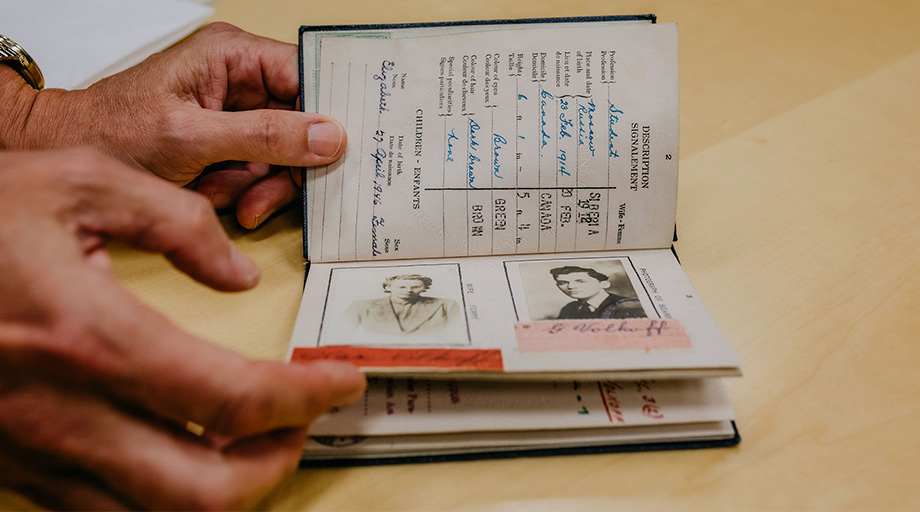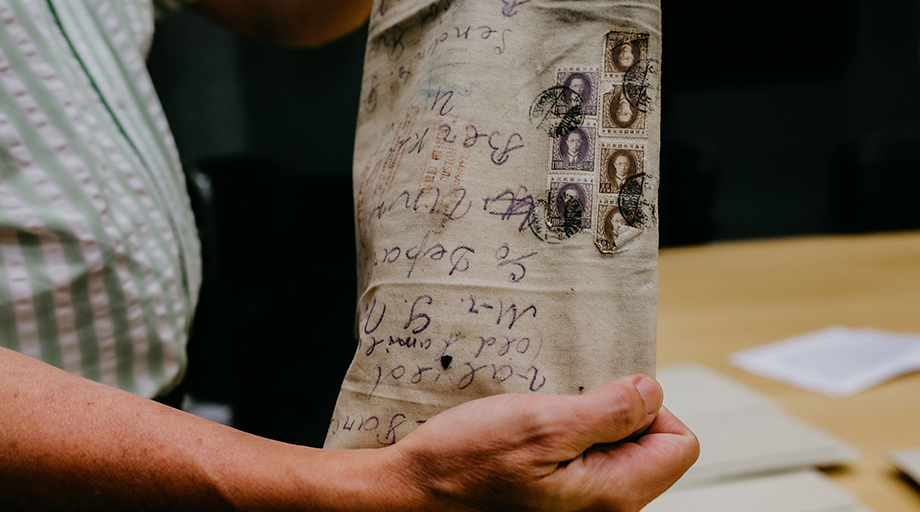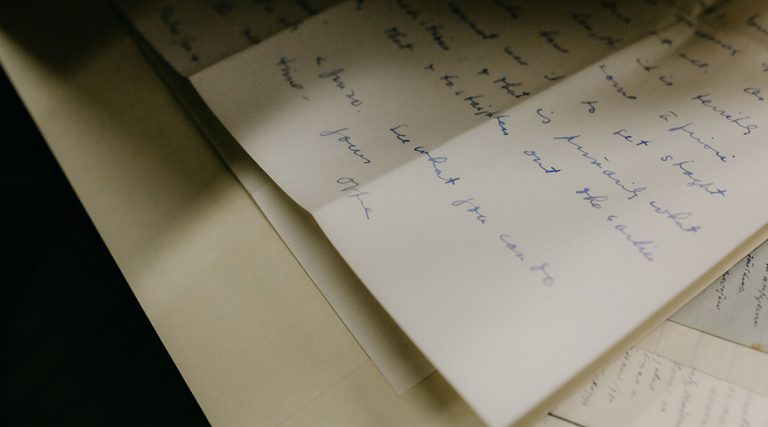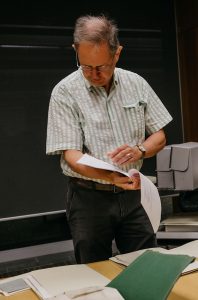
UBC Archives has received the collected archives of the Volkoff Family. Through manuscripts, correspondence, research notes, academic records and more, the fonds documents the personal lives and careers of prominent theoretical physicist Dr. George Volkoff (1914-2000) and microbiology researcher Olga Volkoff (1912-2005).
George Volkoff emigrated with his family from Russia to Canada when he was 10 years old, settling first in Winnipeg, then in Vancouver where George attended Lord Roberts Elementary School, writes Erwin Wodarczak, Acting Head of UBC Archives, who compiled the Volkoff Family fonds: “His father was an engineer, but could not find appropriate work in Canada. The family relocated to Harbin, Manchuria, in 1927, where George attended a Russian-language high school.”

Original mailbag that contained letters and other documents from the Volkoff Family archive.
Volkoff eventually found his way back to Vancouver and attended UBC from 1930 to 1936, finishing top of his class and winning the 1934 Governor-General’s Award with a Bachelor of Arts in physics, followed by a Master in Arts. Making his way to San Francisco, he attended graduate school at the University of California, Berkeley. “While George was there, his father sent him a lot of correspondence and other writing about the history of his family,” says Wodarczak, noting that much of this correspondence was kept by Volkoff in a well-worn mailbag, now included in the archive.
The fonds also contains George Volkoff’s PhD dissertation, in both manuscript and final form. Notably, one of Volkoff’s thesis advisors at Berkeley was Dr. J. Robert Oppenheimer, a professor of physics and head of the Los Alamos Laboratory, whose role in the Manhattan Project during World War II resulted in the development of the world’s first nuclear weapons.
“We have a couple of letters that Oppenheimer wrote to Volkoff—which in and of themselves would be pretty valuable, I expect—talking about Volkoff’s thesis, his dissertation,” says Wodarczak.

Handwritten letter from J. Robert Oppenheimer to George Volkoff, signed “Yours Oppie” at the bottom.
In 1940, Volkoff published the pioneering paper, “On Massive Neutron Cores” in the journal Physical Review with Oppenheimer as a co-author, which predicted the existence of neutron stars three decades before they were actually observed. The article manuscript is also included in the archive.
Olga Volkoff (née Okulitch) completed her Bachelors in Arts at UBC in 1933, with majors in bacteriology and microbiology, followed by a Master in Arts in 1935. She and George met as students at UBC, and married in 1940, together raising three daughters, Elizabeth, Alexandra, and Olga.
That year, George accepted an assistant professor position at UBC, says Wodarczak, but was very quickly recruited to work on the Manhattan Project at the Montreal Laboratory established by the National Research Council as part of the war effort.

Erwin Wodarczak, Acting Head of UBC Archives.
While the Volkoffs lived in Montreal, Olga worked at a laboratory that was involved in the first commercial production of penicillin, while George contributed to the design of the CANDU reactor, the first nuclear reactor in Canada. Returning to UBC as a professor in 1947, George was appointed Head of the Department of Physics in 1961, the Dean of Science in 1970 and before retiring in 1979. The Volkoffs continued to live in University Hill after retirement, and were involved in the local campus community for many years.
The archives were generously donated by George and Olga’s daughters Elizabeth Bell and Alexandra Volkoff. While most of the manuscripts, correspondence, and official documents included in the fonds are written in Russian, using the Cyrillic alphabet, some official documents originating from Harbin, Manchuria are written in Chinese. Bell provided English translations of key Russian language materials in the archive, including the two-volume family chronicle written by her grandfather (George’s father), Mikhail Mikhailovich Volkoff.
UBC Archives was also loaned two photograph albums from which select photos were digitized and added to the fonds. A complete inventory of the archive is available to view on the library website.
This project is part of UBC Library’s strategic direction to create and deliver responsive collections.
Learn more about our Strategic Framework.
